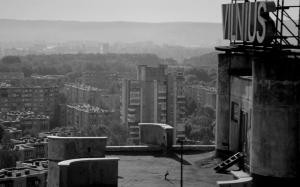City, Cinema, and Media: Baltic Sea Region Film Conference
Call for papers: Baltic Sea Region Film Conference City, Cinema, and Media (Vilnius, Lithuania)

Abstract/Panel submission deadline: June 23, 2023
Conference dates: October 20–21, 2023
Venue: Sinemateka (Goštauto str. 2, Vilnius)
Mode of participation: In person only
Conference language: English
Organizer: Lithuanian Academy of Music and Theatre, Lithuanian Culture Research Institute, Media Education and Research Centre “Meno avilys”
Partners: Film Archive of the National Archives of Estonia, Latvian Academy of Culture, Vilnius City Municipality
In the light of global processes, such as climate change, militarization, and geopolitical reshufflings, a city is both a backdrop and an active participant in ever-evolving ways of mediating the transformation of conditions for human and non-human dwellers. Such films as For Sama (dir. Waad Al-Kateab, 2019) and Mariupolis 2 (dir. Mantas Kvedaravičius and Hanna Bilobrova, 2022) capture urban experiences from a personal perspective. As we witness the new forms of audiovisual mediation enter our public and private spaces, the conference invites the researchers to collectively reflect about them. City, Cinema, and Media (the 8th edition of the Baltic Sea Region Film History Conference) focuses on the cinema and urban space. The conference engages with questions of representation, distribution, exhibition and audience, as well as intersections of urban, cinema and media studies.
Historically, cinema’s connections with the city have been referred to as chemistry between “celluloid and asphalt.” In classical film studies, both the city and cinema have been analyzed through frameworks of modernity. However, today when we think about moving image and a city, we also think about a pixel and forms of data representation, digital and global interconnections. The contemporary urban and cinema studies demonstrate how productive such interdisciplinary approaches are. The crucial changes in moving image technology (digital turn) and global urbanization, brought the remarkably productive spatial turn into cinema studies. By now it is widely accepted that cinema is a particularly spatial form of media which both organizes the spatial imaginaries inside the frame and at the same time actively renders the space through film production, distribution, and exhibition.
The goal of this conference is to bring together researchers who are interested in cinema, media studies and the cross disciplinary approach of film (moving image, home movies, performing arts, etc.), audiovisual media (TV, video games) and city (urban studies, architecture, geography, art, literature, etc.). We welcome papers from researchers across the academic spectrum as well as inter/transdisciplinary engagements and encourage papers from scholars focusing on both cinema history, contemporary film, media cultures, Baltic Sea region related topics and beyond.
Possible topics may include, but are not limited to:
- Cinema and urban cultures;
- Cinematic urban genres, tropes and narratives;
- Cities in audiovisual imaginaries;
- Urban visions and visualizations in moving image, urban architecture in audiovisual media;
- Urban soundscapes in audiovisual media;
- Urban place and space in audiovisual media;
- Home in the city – cinematic representation of public and non-public spaces;
- Screen cultures in public and private urban spaces;
- Film exhibition infrastructure, cinemas in cities, audiences and distribution practices in cities;
- Role of film festivals in film and urban cultures;
- Digital city and city as a global film-set;
- Urban representations of disasters, war and conflict in film;
- Queering the city in film;
- Feminism and city in film;
- Body and urban space in film;
- Film archives as urban infrastructures;
- Security cameras in public and private urban spaces;
- City and ecosystem in moving image;
- Urban environmental media;
- City and securitization discourse in film;
- City, design and fashion in film;
- Decolonizing the urban space in/through film and media;
- Decolonial methodologies in cinema and media studies.
For queries regarding submissions, please contact conference organisers:
PhD Lina Kaminskaitė lina.jancoriene@lmta.lt and PhD Ilona Jurkonytė conference@balticfilmhistory.org
Program committee and coordinators: PhD Eva Näripea, PhD Zane Balčus, Mantė Valiūnaitė, Vitalij Binevič, Ona Kotryna Dikavičiūtė.
The conference proceedings will form the basis for a thematic issue of the academic journal Studies in Eastern European Cinema.
SUBMISSION GUIDLINES
Paper proposals in English (250–300 words) and a short biography (200 words) is expected by June 23, 2023 and can be submitted here: BalticFilmConference2023.
Applicants will be notified of acceptance/nonacceptance by July 7, 2023.
There are no conference fees.
LMTA Department of History and Theory of Art
17 May 2023
